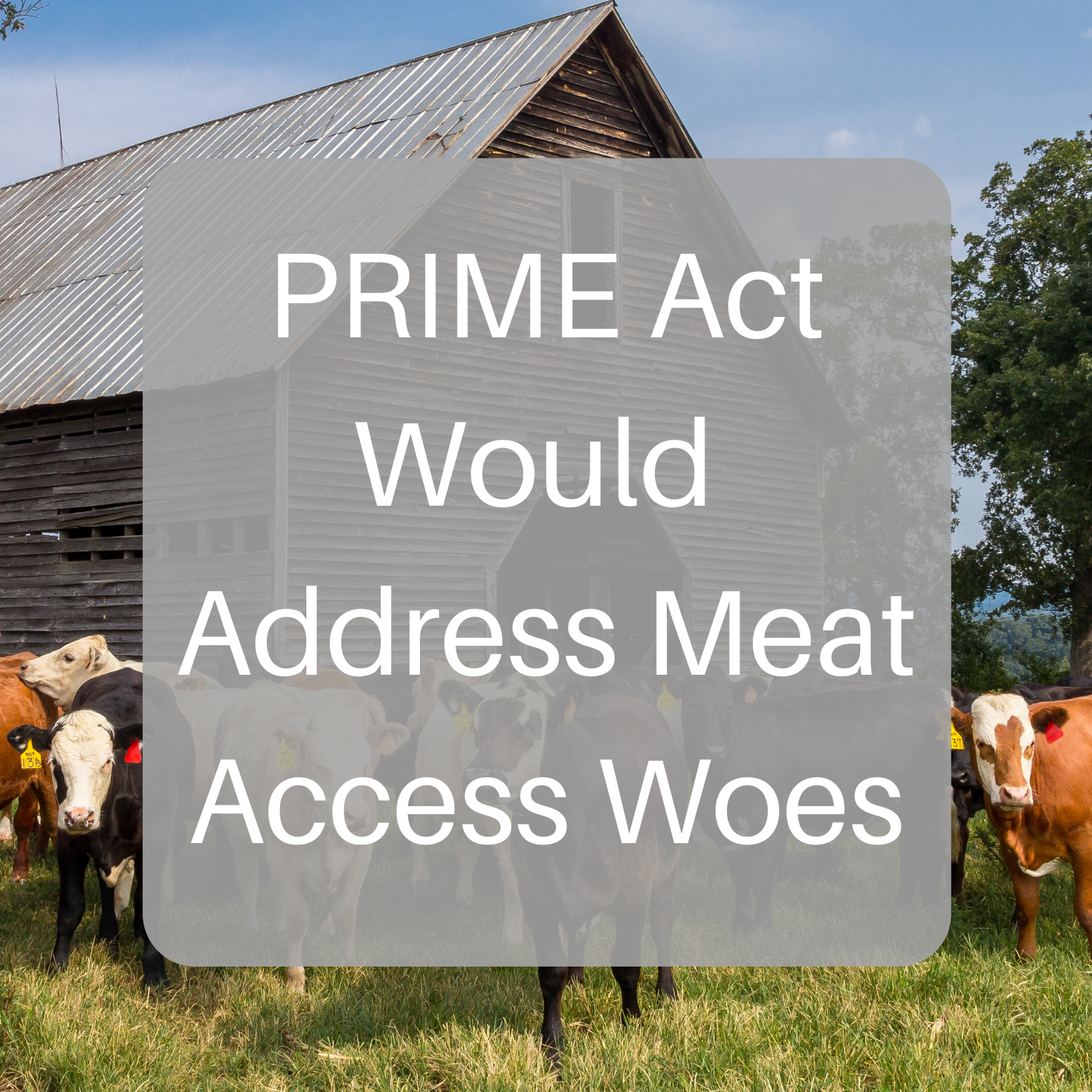
A recent survey among Farm-to-Consumer Legal Defense Fund (FTCLDF) members indicates that members’ top concerns include the unavailability of meat processors and regulations that interfere with the ability of farmers and ranchers to deliver farm products directly to the consumer.
The Processing Revival and Intrastate Meat Exemption (PRIME) Act would repeal the ban on the intrastate sale of meat slaughtered and processed at custom meat processors. Custom meat processors are regulated by both federal and state law. Federal law prohibits the selling of any adulterated meat product, whether from a federal, state or custom slaughter facility (9 C.F.R. § 303.1). Federal regulations also set forth detailed requirements that address custom processing facilities, the grounds, equipment, and procedures that ensure sanitary conditions. Custom processing plants are still subject to inspection, but there need not be an inspector on site during all processing. Permitting smaller independent producers’ access to custom slaughter facilities to prepare animals for the sale of meat products would greatly assist local farmers and decentralize the country’s meat supply.
There has been tremendous consolidation in the meat processing industry over the last several decades. The top four beef processors control approximately 80% of the U.S. meat supply. The top four pork processors account for approximately 63% of the U.S. market. This consolidation into just a few processors has led to fewer and larger meat slaughter and processing facilities. As we have seen the past few months, the closure of one or more of these plants can have a serious impact on the nation’s meat supply.
The consolidation of the U.S. meat processing industry has been particularly difficult on smaller, local operations. Local processing plants that satisfy the United States Department of Agriculture (USDA) or state requirements are in short supply. These often will not accept small quantities for processing, thus making it nearly impossible for smaller meat producers to ensure inspection of products for sale to consumers. At best, small producers are often told that plants cannot process their meat for six months. At worst, they are turned away. Many FTCLDF members are being quoted dates for slaughter and processing well into 2022. In addition, small producers may have to transport their livestock long distances for processing at these plants, often hundreds of miles, creating both environmental impact and unnecessary stress to the animals transported for slaughter.
COVID-19 created instability in the nation’s food supply as numerous plants closed in the wake of outbreaks. Meanwhile, consumer demand for local sustainably grown foods is increasing. Consumers want to know how their food is grown and processed, are interested in a shorter supply chain, and wish to support local producers.
Independent farmers can be a large part of the solution, yet they lack feasible access to approved processing facilities. In addition, while custom slaughter operations can process meat for an animal owner, these facilities are prohibited from processing meat for sale.
The federal Wholesome Meat Act (21 C.F.R. § 601 et. al.) requires that all meat for sale is slaughtered and processed in USDA inspected facilities or state facilities that follow standards at least as stringent as federal rules.
The PRIME Act
The solution to meet consumer demand and stabilize the nation’s food supply is passage of the PRIME Act, Senate Bill 1620 (S. 1620) and House Bill 2859 (H.R. 2859). The PRIME Act would repeal the ban on sale of meat processed by “custom slaughterhouses” that meet federal and state regulatory standards. Again, federal law regulates these facilities and states are free to develop additional regulations of the industry to ensure safety while increasing access to wholesome food.
The current USDA practices and procedures drives out small producers and processors at a critical time when our food supply demands more, not less, producers. This in turn has placed the U.S. market for meat, and consumers, in a vulnerable position. It has placed almost all of our beef and pork production in the hands of just a few giant corporations and thus placed the food supply at risk.
The PRIME Act would diversify production, stabilize the supply of healthy meat, and assist consumers in obtaining locally produced foods from farms and ranches they trust.
We encourage you to review additional information relevant to the PRIME Act HERE.
To take action, visit the action alert section of our website HERE to learn more about contacting your senators and representatives about this issue.
YOUR FUND AT WORK
Services provided by FTCLDF go beyond legal representation for members in court cases.
Educational and policy work also provide an avenue for FTCLDF to build grassroots activism to create the most favorable regulatory climate possible. In addition to advising on bill language, FTCLDF supports favorable legislation via action alerts and social media outreach.
You can protect access to real foods from small farms by becoming a member or donating today.